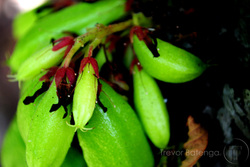
Genesis 3:3 But of the fruit of the tree which is in the midst of the garden, God hath said, ye shall not eat of it, neither shall ye touch it, lest ye die.
A narrow dark path leads from our missionary compound to Ellinwood Bible School, an aging, blue two-story building full of pretty Filipina deaconesses. The first floor holds classrooms and the cafeteria. On the second floor, the girls sleep in crowded gloomy dorm rooms, their beds draped with mosquito nets. It must have been a grand building once, but now the rusted screens are mended to keep out flies. Feral cats breed under its crawl space. Our community cat Melting Snow bore her kittens there, feasting on rotting garbage, bloody napkins, and the gentle devotion of homesick girls. My 27-year-old mother walks this path after breakfast each day to teach Christian Education curriculum.
The deaconesses are sincerely pious in a girly way. They gently cup palms to their mouths when they giggle. They tweak our cheeks more tenderly than the matrons at Ellinwood Church. When mom turns 28, then 29, a flock of deaconesses in gray and white uniforms cluster up our concrete stairs to serenade her in sweet harmony:
“Once again has come your birthday,
Once again the time is here.
What a lovely gift from Jesus,
He has kept you one more year.
Happy time, your birthday,
Happy time is here.
What a lovely gift from Jesus,
He has kept you one more year.”
I see the deaconess when they sing, or come to visit in our sala, and at graduation, when they will fly away. Then they change from plain sparrow clothes into soft organza ternos capped with stiff butterfly sleeves. Some wear the old fashioned paneulo shawl over their camisa and drape a transparent juci tapis over their saya. These girls come from far away provinces, and maybe, says my mother, they have carefully laid away their mother’s only best dress for this moment, their glory day in Manila before returning home. So, oh, how they flutter and preen at their baccalaureate, swirling delightedly around the humbly decorated hall. This is a vision of the angels that will greet us in heaven and I hide behind my mother’s skirt, stricken shy.
But no matter how they dance, my anxious affection for Ellinwood Bible School is not directed at them.
It is wholly fixed on the camias tree that beckons from the end of the path at the edge of the Bible School yard. Clusters of green fingerlings dangle from its twisted branches. Tiny camias sprout off the black trunk like whiskers. Camias taste like the South China Sea—sour, wet, and crisp. Like the green sea, they’re translucent. When a sun shaft hits the wizened branches, the fruit light up like Christmas bulbs.
If you have the eyes to see, you can tell that the camias is a solitary tree. It’s gnarled and shy, with branches curled close to the trunk. It stands apart from the other trees. You wonder if they gossip about the little camias, rustling their leaves high above the galvanized roof of the Bible School. When my mother passes the camias on her way to teach the deaconesses, it is just an ugly ordinary tree. She doesn’t know it is the source of my anguish and desire.
How many times must they tell us not to take and eat of the fruit? The irritated Bible School janitor circles the trunk with old barbed wire. We really try, we do, but if you have a salt-and-sour tooth, then green mango can satisfy, or the dry flesh of santol, or a handful of little sineguelas. In the end, your mouth whines to crunch on camias till your lips pucker. When we are denied the trunk, my scraggly clan of camias-eaters scale onto the ledge of the elementary school and steal camias higher up. We fill our pockets, sneak down to the kitchen for sea salt crystals and crunch our stolen treats until we’re sick, clutching acid stomachs. We suck our dry sandpaper tongue and can’t eat dinner.
I tell you, my desire for camias is a getter of wisdom. I knew from an early age the hidden mystery of the Fall. When mom reads the story of Rapunzel, and I hear that while she is still inside her mother's womb, her mother has naglilihi for fruit in the witch’s garden, I know the craving cannot be denied. Her husband must bargain with the witch for the price of their child.
But think: Eve didn't crave the fruit from the tree of the knowledge of good and evil. She was not naglilihi. She was not even considering merienda. Before God mentioned it and the cunning serpent psst her, she didn't even noticed the tree-in-the-middle-of-the-garden. So, why did she desire the fruit? Because of God's negative advertising. Really. I know how it is to be tested. If you can't have it, it tastes more delicious. And then you really wonder, how did the serpent and the Garden's angels know the fruit was tasty? When God sent the humans away, the angels guarded the entrance with flaming swords. But you wonder what they did on their day off, when they had Garden to themselves.
A narrow dark path leads from our missionary compound to Ellinwood Bible School, an aging, blue two-story building full of pretty Filipina deaconesses. The first floor holds classrooms and the cafeteria. On the second floor, the girls sleep in crowded gloomy dorm rooms, their beds draped with mosquito nets. It must have been a grand building once, but now the rusted screens are mended to keep out flies. Feral cats breed under its crawl space. Our community cat Melting Snow bore her kittens there, feasting on rotting garbage, bloody napkins, and the gentle devotion of homesick girls. My 27-year-old mother walks this path after breakfast each day to teach Christian Education curriculum.
The deaconesses are sincerely pious in a girly way. They gently cup palms to their mouths when they giggle. They tweak our cheeks more tenderly than the matrons at Ellinwood Church. When mom turns 28, then 29, a flock of deaconesses in gray and white uniforms cluster up our concrete stairs to serenade her in sweet harmony:
“Once again has come your birthday,
Once again the time is here.
What a lovely gift from Jesus,
He has kept you one more year.
Happy time, your birthday,
Happy time is here.
What a lovely gift from Jesus,
He has kept you one more year.”
I see the deaconess when they sing, or come to visit in our sala, and at graduation, when they will fly away. Then they change from plain sparrow clothes into soft organza ternos capped with stiff butterfly sleeves. Some wear the old fashioned paneulo shawl over their camisa and drape a transparent juci tapis over their saya. These girls come from far away provinces, and maybe, says my mother, they have carefully laid away their mother’s only best dress for this moment, their glory day in Manila before returning home. So, oh, how they flutter and preen at their baccalaureate, swirling delightedly around the humbly decorated hall. This is a vision of the angels that will greet us in heaven and I hide behind my mother’s skirt, stricken shy.
But no matter how they dance, my anxious affection for Ellinwood Bible School is not directed at them.
It is wholly fixed on the camias tree that beckons from the end of the path at the edge of the Bible School yard. Clusters of green fingerlings dangle from its twisted branches. Tiny camias sprout off the black trunk like whiskers. Camias taste like the South China Sea—sour, wet, and crisp. Like the green sea, they’re translucent. When a sun shaft hits the wizened branches, the fruit light up like Christmas bulbs.
If you have the eyes to see, you can tell that the camias is a solitary tree. It’s gnarled and shy, with branches curled close to the trunk. It stands apart from the other trees. You wonder if they gossip about the little camias, rustling their leaves high above the galvanized roof of the Bible School. When my mother passes the camias on her way to teach the deaconesses, it is just an ugly ordinary tree. She doesn’t know it is the source of my anguish and desire.
How many times must they tell us not to take and eat of the fruit? The irritated Bible School janitor circles the trunk with old barbed wire. We really try, we do, but if you have a salt-and-sour tooth, then green mango can satisfy, or the dry flesh of santol, or a handful of little sineguelas. In the end, your mouth whines to crunch on camias till your lips pucker. When we are denied the trunk, my scraggly clan of camias-eaters scale onto the ledge of the elementary school and steal camias higher up. We fill our pockets, sneak down to the kitchen for sea salt crystals and crunch our stolen treats until we’re sick, clutching acid stomachs. We suck our dry sandpaper tongue and can’t eat dinner.
I tell you, my desire for camias is a getter of wisdom. I knew from an early age the hidden mystery of the Fall. When mom reads the story of Rapunzel, and I hear that while she is still inside her mother's womb, her mother has naglilihi for fruit in the witch’s garden, I know the craving cannot be denied. Her husband must bargain with the witch for the price of their child.
But think: Eve didn't crave the fruit from the tree of the knowledge of good and evil. She was not naglilihi. She was not even considering merienda. Before God mentioned it and the cunning serpent psst her, she didn't even noticed the tree-in-the-middle-of-the-garden. So, why did she desire the fruit? Because of God's negative advertising. Really. I know how it is to be tested. If you can't have it, it tastes more delicious. And then you really wonder, how did the serpent and the Garden's angels know the fruit was tasty? When God sent the humans away, the angels guarded the entrance with flaming swords. But you wonder what they did on their day off, when they had Garden to themselves.

 RSS Feed
RSS Feed
